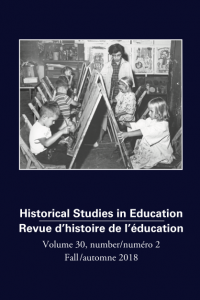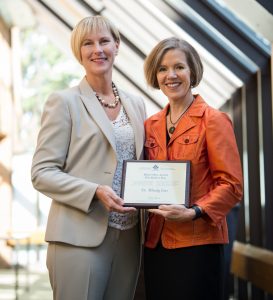
Authors: Dr. Penney Clark (EDCP) & Dr. Mona Gleason (EDST), Co-editors
Dr. Jason Ellis (EDST), Book review editor (English)
K. M. Gemmell (EDCP), Managing Editor
Published: 26 September 2018, Historical Studies in Education / Revue d’histoire de l’éducation
Historical Studies in Education / Revue d’histoire de l’éducation has just published its latest issue at:
http://historicalstudiesineducation.ca/index.php/edu_hse-rhe/issue/view/441
We invite you to review the Table of Contents below and then visit our website to review articles and items of interest.
Articles
|
Ken Osborne
|
|
James Rempel, Amy von Heyking
|
|
Jason Ellis
|
|
Daniel Poitras
|
|
Adriana Morales-Perlaza
|
Bibliography / Bibliographie
|
Bibliography of Canadian Educational History / Bibliographie d’histoire de l’éducation canadienne
Kristin Hall
|
Book Reviews / Comptes Rendus
|
André Turmel, Le Québec par ses enfants. Une sociologie historique (1850–1950)
Denyse Baillargeon
|
|
Marc-André Éthier, David Lefrançois et François Audigier (dirs), Pensée critique, enseignement de l’histoire et de la citoyenneté
Hans Boulay
|
|
Catherine Foisy, Au risque de la conversion. L’expérience québécoise de la mission au XXe siècle (1945–1980)
Lucia Ferretti
|
|
Henri Goulet, Histoire des pensionnats indiens catholiques au Québec. Le rôle déterminant des pères oblats
Catherine Larochelle
|
|
Mona Gleason and Tamara Myers, eds., Bringing Children & Youth into Canadian History: The Difference Kids Make
Karen Balcom
|
|
Keith Crawford, Arthur Mee: A Biography
Penney Clark
|
|
Pamela Grundy, Color and Character: West Charlotte High and the American Struggle over Educational Equality
Ansley T. Erickson
|
|
Rivka Feldhay and F. Jamil Ragep, eds., Before Copernicus: The Cultures and Contexts of Scientific Learning in the Fifteenth Century
Margaret Gaida
|
|
Rosa Bruno-Jofré and Jon Igelmo Zaldívar, eds., Catholic Education in the Wake of Vatican II
Peter Meehan
|
|
Theodore Michael Christou, ed., The Curriculum History of Canadian Teacher Education
Dianne M. Miller
|
|
Ning Wang, Banished to the Great Northern Wilderness: Political Exile and Re-education in Mao’s China
Aminda Smith
|
Contributors / Collaborateurs
|
Contributors/Collaborateurs
|


